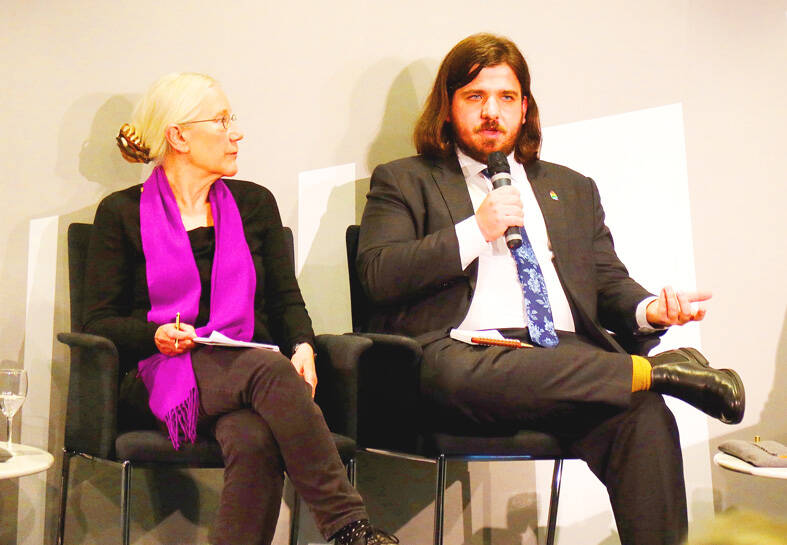A German academic on Monday told a Taiwan forum in Berlin that Russia’s invasion of Ukraine should serve as a wake-up call for Taipei, as Taiwanese are not taking China’s military threats seriously.
Gudrun Wacker, a senior fellow at the German Institute for International and Security Affairs’ Asia research division, made the remarks during a panel discussion at the first Berlin Taiwan Conference, titled “Taiwan: Opportunities and Challenges in Times of Geopolitical Change.”
The two-day conference began on Monday at the European House in Berlin, and was attended by nearly 100 people.

Photo: CNA
Wacker said that Taiwanese have become accustomed to Chinese threats of military force and do not take them seriously, making it difficult to maintain vigilance and prepare for war.
As such, using the phrase “today’s Ukraine, tomorrow’s Taiwan” to draw a parallel between Ukraine and Taiwan makes sense, she said.
Russia’s invasion of Ukraine shows how irrational world leaders can be in making political decisions, while completely ignoring the economy, Wacker said.
Therefore, the Russia-Ukraine war should serve as an alarm for Taiwan, awakening people there to face the last thing they want to face, she said.
Wacker was responding to Emily Wu (吳怡慈), cofounder of Taiwan-based podcast network Ghost Island Media, who discussed the Taiwanese experience in countering China’s influence.
Wu said that although China conducted military exercises around Taiwan after US House of Representatives Speaker Nancy Pelosi visited the nation in August, Taiwanese generally remained calm and went about their lives as usual.
Wacker said that in the past few years, Germany has highlighted Taiwan as a “value partner” in official documents.
When it comes to issues such as LGBTQ+ rights, it is difficult for Germany to find a partner in Asia with a similar stance to Taiwan’s, she said.
China imposed trade sanctions on Lithuania after it allowed Taiwan to establish a representative office in Vilnius last year with “Taiwanese” in the title, fostering a sense of unity in Europe as a result, Wacker said.
EU members should be careful not to be divided while engaging with China, she said.
Event organizer Reinhard Butikofer, a German member of the European Parliament and chairman of the European Parliament’s Delegation for Relations with the People’s Republic of China, said in a speech that the current German administration, which came to power at the end of last year, mentioned Taiwan for the first time in its coalition agreement, signifying a positive shift in attitude toward the nation.
In addition to supporting Taiwan’s participation in the international community, the agreement also emphasizes that the “status quo” in the Taiwan Strait can only be changed under the conditions of peace and mutual consent, Butikofer said.
Most members of the European Parliament support Taiwan, and the establishment of a bilateral investment agreement between the EU and Taiwan, he said.

ANOTHER EMERGES: The CWA yesterday said this year’s fourth storm of the typhoon season had formed in the South China Sea, but was not expected to affect Taiwan Tropical Storm Gaemi has intensified slightly as it heads toward Taiwan, where it is expected to affect the country in the coming days, the Central Weather Administration (CWA) said yesterday. As of 8am yesterday, the 120km-radius storm was 800km southeast of Oluanpi (鵝鑾鼻), Taiwan’s southernmost tip, moving at 9kph northwest, the agency said. A sea warning for Gaemi could be issued tonight at the earliest, it said, adding that the storm is projected to be closest to Taiwan on Wednesday or Thursday. Gaemi’s potential effect on Taiwan remains unclear, as that would depend on its direction, radius and intensity, forecasters said. Former Weather Forecast

As COVID-19 cases in Japan have been increasing for 10 consecutive weeks, people should get vaccinated before visiting the nation, the Centers for Disease Control (CDC) said. The centers reported 773 hospitalizations and 124 deaths related to COVID-19 in Taiwan last week. CDC Epidemic Intelligence Center Director Guo Hung-wei (郭宏偉) on Tuesday said the number of weekly COVID-19 cases reported in Japan has been increasing since mid-May and surpassed 55,000 cases from July 8 to July 14. The average number of COVID-19 patients at Japan’s healthcare facilities that week was also 1.39 times that of the week before and KP.3 is the dominant

The Chinese Communist Party’s (CCP) working group for Taiwan-related policies is likely to be upgraded to a committee-level body, a report commissioned by the Mainland Affairs Council (MAC) said. As Chinese President Xi Jinping (習近平) is increasingly likely to upgrade the CCP’s Central Leading Group for Taiwan Affairs, Taiwanese authorities should prepare by researching Xi and the CCP, the report said. At the third plenary session of the 20th Central Committee of the CCP, which ended on Thursday last week, the party set a target of 2029 for the completion of some tasks, meaning that Xi is likely preparing to

US-CHINA TRADE DISPUTE: Despite Beijing’s offer of preferential treatment, the lure of China has dimmed as Taiwanese and international investors move out Japan and the US have become the favored destinations for Taiwanese graduates as China’s attraction has waned over the years, the Ministry of Labor said. According to the ministry’s latest income and employment advisory published this month, 3,215 Taiwanese university graduates from the class of 2020 went to Japan, surpassing for the first time the 2,881 graduates who went to China. A total of 2,300 graduates from the class of 2021 went to the US, compared with the 2,262 who went to China, the document showed. The trend continued for the class of 2023, of whom 1,460 went to Japan, 1,334 went to